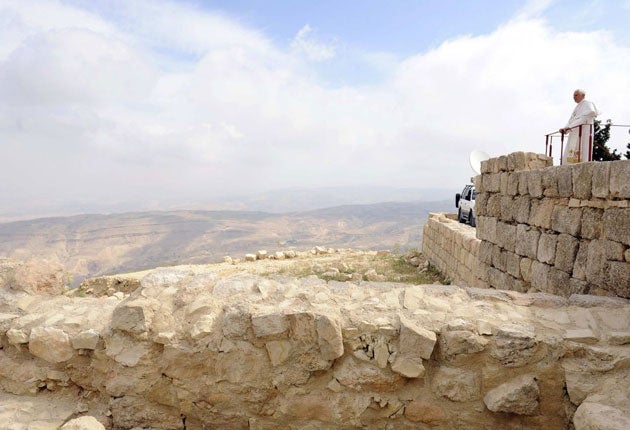Church and Jews share 'inseparable bond' says Pope

Your support helps us to tell the story
This election is still a dead heat, according to most polls. In a fight with such wafer-thin margins, we need reporters on the ground talking to the people Trump and Harris are courting. Your support allows us to keep sending journalists to the story.
The Independent is trusted by 27 million Americans from across the entire political spectrum every month. Unlike many other quality news outlets, we choose not to lock you out of our reporting and analysis with paywalls. But quality journalism must still be paid for.
Help us keep bring these critical stories to light. Your support makes all the difference.
Pope Benedict XVI said today that his visit to the Middle East was a reminder of the "inseparable bond" between the Catholic Church and the Jewish people, a relationship that has been strained at times under his leadership.
The pope spoke from Mount Nebo, the wind-swept hill overlooking the Jordan valley from where the Bible says Moses saw the Promised Land. The sun broke through the morning mist just before the pope arrived at the site on the second day of a weeklong visit to the Middle East that will also take him to Israel and the Palestinian territories.
He later toured the oldest mosque in Jordan's capital, Amman, his second visit to a Muslim place of worship since becoming pope in 2005. Prince Ghazni bin Mohammed, the top religious adviser to Jordan's king, thanked him for his expression of "regret" after a 2006 speech that many Muslims deemed insulting to Islam's Prophet Muhammad.
Ghazni says he also appreciated the pope's clarification that the quotes from a Medieval text about Muhammad that he used in the speech did not reflect his personal views.
Benedict told the audience at the mosque that Muslims and Christians must strive to be seen as faithful worshippers of God.
Earlier, at Mount Nebo, Benedict said, "May our encounter today inspire in us a renewed love for the canon of sacred scripture and a desire to overcome all obstacles to the reconciliation of Christians and Jews in mutual respect and cooperation in the service of that peace to which the word of God calls us."
The pope sparked outrage among many Jews earlier this year when he revoked the excommunication of an ultraconservative bishop who denies the Holocaust. Benedict had lifted his excommunication along with three other ultraconservative prelates in a bid to end a church schism. But amid the uproar, the church has not allowed the bishop to resume his duties.
The pope's forceful condemnation of anti-Semitism and acknowledgment of Vatican mistakes have softened Jewish anger over the bishop. But another sore point has been World War II Pope Pius XII, whom Benedict has called a "great churchman." Jews and others say he failed to do all he could to stop the extermination of European Jews.
Despite the disputes, Jewish leaders say Benedict, who served in the Hitler Youth corps as a young man in Germany and then in the army before deserting near the end of the war, has an excellent record in fighting anti-Semitism. He has already visited synagogues in Cologne, Germany, and New York and is expected at Rome's central synagogue later this year.
The pope's visit to Mount Nebo was the first of many that Benedict will make to holy places during his first visit to the Middle East.
"The ancient tradition of pilgrimage to the holy places also reminds us of the inseparable bond between the church and the Jewish people," said Benedict. "From the beginning, the church in these lands has commemorated in her liturgy the great figures of the patriarchs and prophets, as a sign of her profound appreciation of the unity of the two testaments."
The pope has also had strained ties with Muslims that he hopes to improve during his Mideast visit. Benedict angered many in the Muslim world three years ago when he quoted a Medieval text that characterized some of Islam's Prophet Muhammad's teachings as "evil and inhuman," particularly "his command to spread by the sword the faith.
The pope expressed his "deep respect" for Islam on Friday and has said he was sorry and that the quotes did not reflect his personal views. But the comments continue to fuel criticism by some Muslims.
Jordan's hard-line Muslim Brotherhood, the country's largest opposition group, said Friday that they were boycotting the pope's visit because he did not issue a public apology ahead of time as they demanded.
Subscribe to Independent Premium to bookmark this article
Want to bookmark your favourite articles and stories to read or reference later? Start your Independent Premium subscription today.
Join our commenting forum
Join thought-provoking conversations, follow other Independent readers and see their replies
Comments